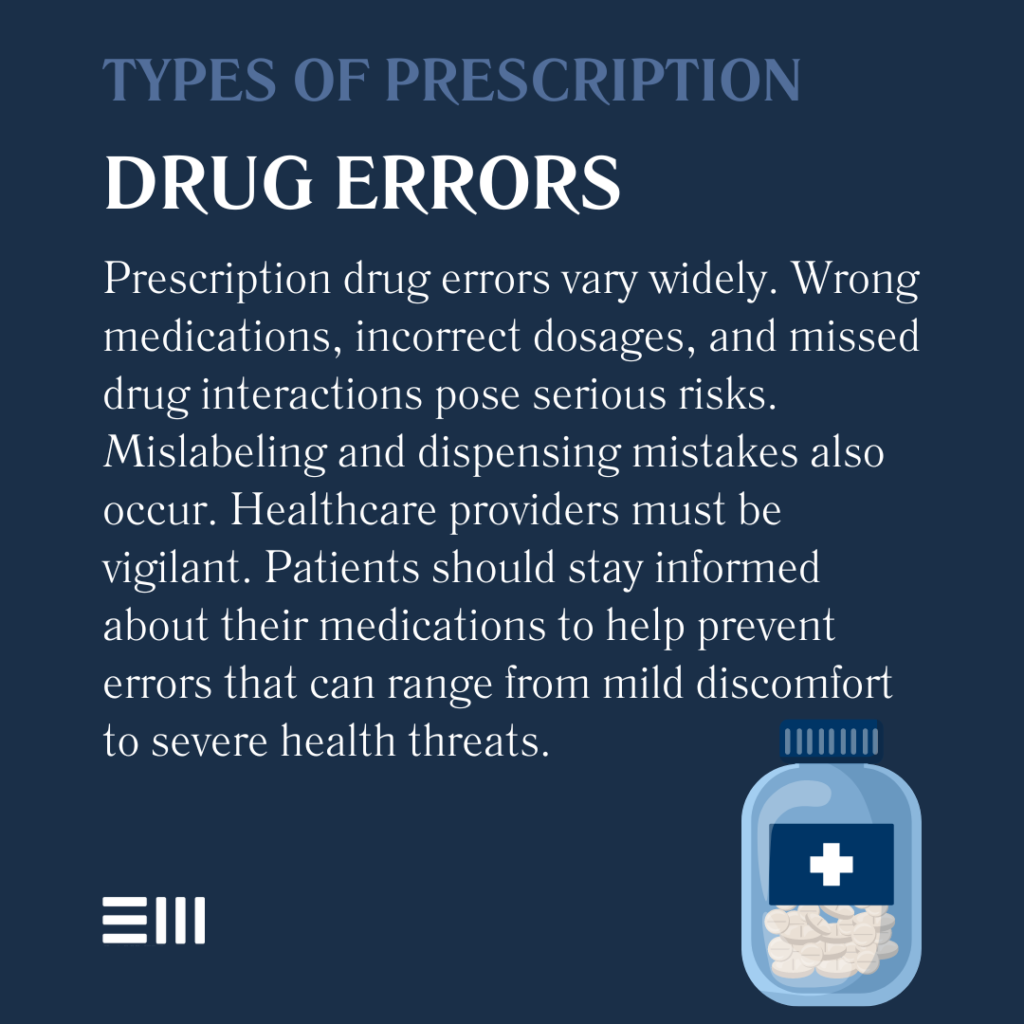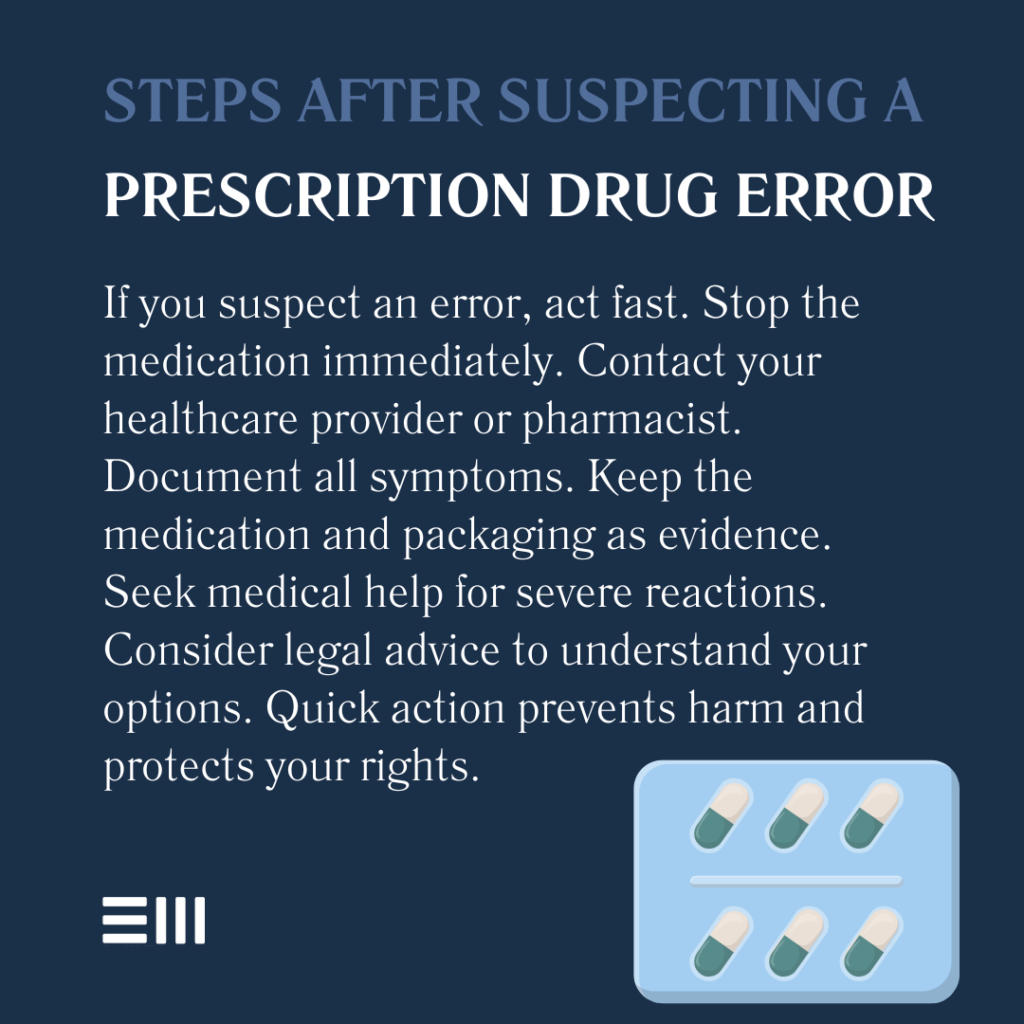
Did you know that medication errors affect at least 7 million patients and cause over 7,000 deaths annually in the United States?
Prescription drug errors, ranging from incorrect dosages to misidentified medications, can have devastating impacts on patients’ health and well-being.
As healthcare systems grow more complex and the number of prescribed medications increases, the risk of such errors also rises.
The consequences can be far-reaching, affecting not only individual patients but also their families, healthcare providers, and the broader medical community.
Understanding Prescription Drug Errors
Prescription drug errors occur when mistakes are made in the process of prescribing, dispensing, or administering medication.
These errors can have severe consequences, ranging from minor discomfort to life-threatening situations.
In Alabama, as in the rest of the country, healthcare providers and pharmacists have a duty of care to ensure patient safety when it comes to medication.
Common types of prescription drug errors include:
- Incorrect medication prescribed;
- Wrong dosage or frequency;
- Failure to account for drug interactions;
- Mislabeling of medication; and
- Dispensing the wrong medication.
Understanding these errors is crucial for patients and their families to recognize potential issues and take appropriate action when necessary.

The Role of Negligence in Prescription Drug Errors
Negligence plays a significant role in many prescription drug error cases. In legal terms, negligence occurs when a healthcare provider or pharmacist fails to exercise the level of care that a reasonably prudent professional would under similar circumstances.
This failure to meet the standard of care can lead to errors that harm patients.
Examples of negligence in prescription drug cases may include:
- A doctor prescribing medication without reviewing the patient’s full medical history;
- A pharmacist misreading a prescription and dispensing the wrong medication; and
- A nurse administering medication to the wrong patient.
Recognizing negligence is essential in determining liability and seeking compensation for damages caused by prescription drug errors.
Liability in Prescription Drug Error Cases
When a prescription drug error occurs due to negligence, various parties may be held liable for the resulting damages.
In Alabama, potential liable parties can include:
- Prescribing physicians;
- Pharmacists and pharmacy staff;
- Hospitals and healthcare facilities; and
- Pharmaceutical companies (in cases of defective drugs or inadequate warnings).
Determining liability often requires a thorough investigation of the error’s circumstances and may involve expert testimony to establish the standard of care and how it was breached.
Legal Options for Victims of Prescription Drug Errors
Victims of prescription drug errors in Alabama have several legal options available to seek compensation for their injuries and losses.
These options may include:
- Filing a medical malpractice lawsuit against the healthcare provider;
- Pursuing a negligence claim against the pharmacy or pharmacist; and
- Seeking compensation through a product liability claim against the drug manufacturer.
Each case is unique, and the appropriate legal strategy will depend on the specific circumstances of the error and the resulting damages.
Proving Negligence and Liability in Prescription Drug Error Cases
To successfully pursue a prescription drug error case in Alabama, the plaintiff must typically prove four key elements:
- Duty of care: Establish that the defendant owed a duty of care to the patient
- Breach of duty: Demonstrate that the defendant failed to meet the standard of care
- Causation: Show that the breach of duty directly caused the patient’s injuries
- Damages: Provide evidence of the harm or losses suffered as a result of the error
Gathering evidence to support these elements often requires a comprehensive investigation, including medical records review, expert testimony, and witness statements.

Compensation in Prescription Drug Error Cases
Victims of prescription drug errors may be entitled to various forms of compensation, depending on the nature and severity of their injuries.
Potential damages in these cases can include:
- Medical expenses (past and future);
- Lost wages and loss of earning capacity;
- Pain and suffering;
- Emotional distress;
- Loss of enjoyment of life; and
- In cases of wrongful death, funeral expenses and loss of companionship.
The amount of compensation awarded will vary based on the specific circumstances of each case and the extent of the damages suffered.
Statute of Limitations for Prescription Drug Error Claims in Alabama
It’s important to note that Alabama has a specific statute of limitations for medical malpractice and negligence claims, including those involving prescription drug errors.
Generally, victims have two years from the date of the injury to file a lawsuit. However, there are exceptions to this rule, such as cases involving minors or instances where the error was not immediately discoverable.
Failing to file a claim within the statute of limitations can result in the loss of the right to seek compensation, making it crucial to consult with an experienced attorney as soon as possible after discovering a prescription drug error.
Preventing Prescription Drug Errors
While legal remedies are available for victims of prescription drug errors, prevention is always the best approach.
Patients can take several steps to reduce the risk of medication errors:
- Keep a complete list of all medications, including over-the-counter drugs and supplements;
- Ask questions about new prescriptions and potential side effects;
- Double-check prescriptions at the pharmacy before leaving;
- Use a single pharmacy for all prescriptions when possible; and
- Inform healthcare providers of any allergies or adverse reactions to medications.
Healthcare providers and pharmacists also play a crucial role in error prevention through proper training, implementing safety protocols, and utilizing technology to reduce the risk of mistakes.
The Impact of Prescription Drug Errors on Patient Safety
Prescription drug errors can have far-reaching consequences beyond the immediate health impacts on patients.
These errors can erode trust in the healthcare system, lead to increased healthcare costs, and create additional strain on medical resources.
Understanding the broader implications of these errors highlights the importance of addressing this issue at both individual and systemic levels.
Recent Developments in Prescription Drug Error Prevention
In recent years, there have been significant advancements in technology and processes aimed at reducing prescription drug errors.
These include:
- Electronic prescribing systems;
- Barcode medication administration;
- Automated dispensing cabinets; and
- Clinical decision support systems.
While these technologies have shown promise in reducing errors, their implementation and effectiveness can vary across healthcare settings.
Frequently Asked Questions About Prescription Drug Errors in Alabama
Navigating the complexities of prescription drug errors can be overwhelming, so we’ve compiled answers to some of the most common questions our clients ask about these cases in Alabama.
What Should I Do If I Suspect a Prescription Drug Error?
If you suspect a prescription drug error, take immediate action:
- Stop taking the medication if you haven’t already;
- Contact your healthcare provider or pharmacist immediately;
- Document all symptoms and when they began;
- Keep the medication and packaging for potential evidence;
- Seek medical attention if you’re experiencing severe symptoms; and
- Consider consulting with a legal professional to understand your options.
Remember, quick action can prevent further harm and protect your legal rights.
Can I Sue a Pharmacy for a Prescription Error?
Yes, you can sue a pharmacy for a prescription error if their negligence caused harm. Pharmacies have a duty to correctly fill prescriptions and provide appropriate guidance to patients. If they breach this duty and it results in injury, they may be held liable.
Potential grounds for a lawsuit against a pharmacy include:
- Dispensing the wrong medication;
- Providing incorrect dosage instructions;
- Failing to identify harmful drug interactions; and
- Mislabeling medication.
An experienced attorney can help you determine if you have a valid claim against a pharmacy.
How Can I Prove Negligence in a Prescription Drug Error Case?
Proving negligence in a prescription drug error case typically involves:
- Establishing the standard of care through expert testimony;
- Demonstrating how the healthcare provider or pharmacist deviated from this standard;
- Showing a direct link between the error and your injuries; and
- Providing evidence of the damages you’ve suffered.
This process often requires a thorough investigation, including:
- Reviewing medical records;
- Gathering witness statements;
- Consulting with medical experts; and
- Analyzing pharmacy records and procedures.
An experienced attorney can help gather and present this evidence effectively.
Recover the Compensation You Deserve
At Baxley Maniscalco, we specialize in prescription drug error cases and have a proven track record of success in helping our clients navigate these challenging situations.
Our team of experienced attorneys understands the intricacies of Alabama law and the medical aspects of prescription drug errors, allowing us to build strong cases on behalf of our clients.
Don’t face the aftermath of a prescription drug error alone.
Contact Baxley Maniscalco today to schedule your free consultation and take the first step toward justice and recovery.
Can't find what you're looking for? Search our site below.










